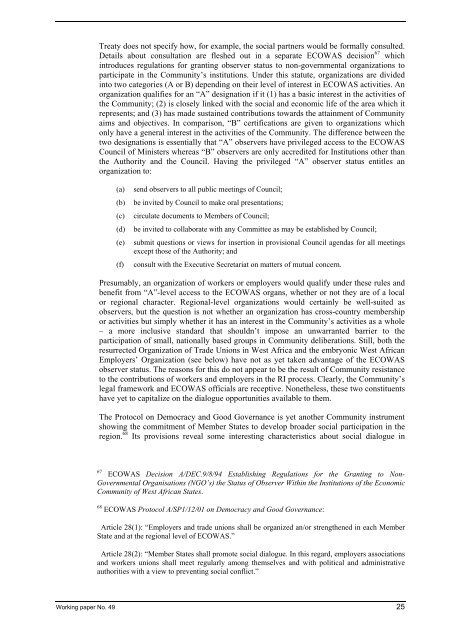The Social Dimension of Regional Integration in ECOWAS
The Social Dimension of Regional Integration in ECOWAS
The Social Dimension of Regional Integration in ECOWAS
Create successful ePaper yourself
Turn your PDF publications into a flip-book with our unique Google optimized e-Paper software.
Treaty does not specify how, for example, the social partners would be formally consulted.<br />
Details about consultation are fleshed out <strong>in</strong> a separate <strong>ECOWAS</strong> decision 67 which<br />
<strong>in</strong>troduces regulations for grant<strong>in</strong>g observer status to non-governmental organizations to<br />
participate <strong>in</strong> the Community’s <strong>in</strong>stitutions. Under this statute, organizations are divided<br />
<strong>in</strong>to two categories (A or B) depend<strong>in</strong>g on their level <strong>of</strong> <strong>in</strong>terest <strong>in</strong> <strong>ECOWAS</strong> activities. An<br />
organization qualifies for an “A” designation if it (1) has a basic <strong>in</strong>terest <strong>in</strong> the activities <strong>of</strong><br />
the Community; (2) is closely l<strong>in</strong>ked with the social and economic life <strong>of</strong> the area which it<br />
represents; and (3) has made susta<strong>in</strong>ed contributions towards the atta<strong>in</strong>ment <strong>of</strong> Community<br />
aims and objectives. In comparison, “B” certifications are given to organizations which<br />
only have a general <strong>in</strong>terest <strong>in</strong> the activities <strong>of</strong> the Community. <strong>The</strong> difference between the<br />
two designations is essentially that “A” observers have privileged access to the <strong>ECOWAS</strong><br />
Council <strong>of</strong> M<strong>in</strong>isters whereas “B” observers are only accredited for Institutions other than<br />
the Authority and the Council. Hav<strong>in</strong>g the privileged “A” observer status entitles an<br />
organization to:<br />
(a) send observers to all public meet<strong>in</strong>gs <strong>of</strong> Council;<br />
(b) be <strong>in</strong>vited by Council to make oral presentations;<br />
(c) circulate documents to Members <strong>of</strong> Council;<br />
(d) be <strong>in</strong>vited to collaborate with any Committee as may be established by Council;<br />
(e) submit questions or views for <strong>in</strong>sertion <strong>in</strong> provisional Council agendas for all meet<strong>in</strong>gs<br />
except those <strong>of</strong> the Authority; and<br />
(f) consult with the Executive Secretariat on matters <strong>of</strong> mutual concern.<br />
Presumably, an organization <strong>of</strong> workers or employers would qualify under these rules and<br />
benefit from “A”-level access to the <strong>ECOWAS</strong> organs, whether or not they are <strong>of</strong> a local<br />
or regional character. <strong>Regional</strong>-level organizations would certa<strong>in</strong>ly be well-suited as<br />
observers, but the question is not whether an organization has cross-country membership<br />
or activities but simply whether it has an <strong>in</strong>terest <strong>in</strong> the Community’s activities as a whole<br />
– a more <strong>in</strong>clusive standard that shouldn’t impose an unwarranted barrier to the<br />
participation <strong>of</strong> small, nationally based groups <strong>in</strong> Community deliberations. Still, both the<br />
resurrected Organization <strong>of</strong> Trade Unions <strong>in</strong> West Africa and the embryonic West African<br />
Employers’ Organization (see below) have not as yet taken advantage <strong>of</strong> the <strong>ECOWAS</strong><br />
observer status. <strong>The</strong> reasons for this do not appear to be the result <strong>of</strong> Community resistance<br />
to the contributions <strong>of</strong> workers and employers <strong>in</strong> the RI process. Clearly, the Community’s<br />
legal framework and <strong>ECOWAS</strong> <strong>of</strong>ficials are receptive. Nonetheless, these two constituents<br />
have yet to capitalize on the dialogue opportunities available to them.<br />
<strong>The</strong> Protocol on Democracy and Good Governance is yet another Community <strong>in</strong>strument<br />
show<strong>in</strong>g the commitment <strong>of</strong> Member States to develop broader social participation <strong>in</strong> the<br />
region. 68 Its provisions reveal some <strong>in</strong>terest<strong>in</strong>g characteristics about social dialogue <strong>in</strong><br />
67 <strong>ECOWAS</strong> Decision A/DEC.9/8/94 Establish<strong>in</strong>g Regulations for the Grant<strong>in</strong>g to Non-<br />
Governmental Organisations (NGO’s) the Status <strong>of</strong> Observer With<strong>in</strong> the Institutions <strong>of</strong> the Economic<br />
Community <strong>of</strong> West African States.<br />
68 <strong>ECOWAS</strong> Protocol A/SP1/12/01 on Democracy and Good Governance:<br />
Article 28(1): “Employers and trade unions shall be organized an/or strengthened <strong>in</strong> each Member<br />
State and at the regional level <strong>of</strong> <strong>ECOWAS</strong>.”<br />
Article 28(2): “Member States shall promote social dialogue. In this regard, employers associations<br />
and workers unions shall meet regularly among themselves and with political and adm<strong>in</strong>istrative<br />
authorities with a view to prevent<strong>in</strong>g social conflict.”<br />
Work<strong>in</strong>g paper No. 49 25

















